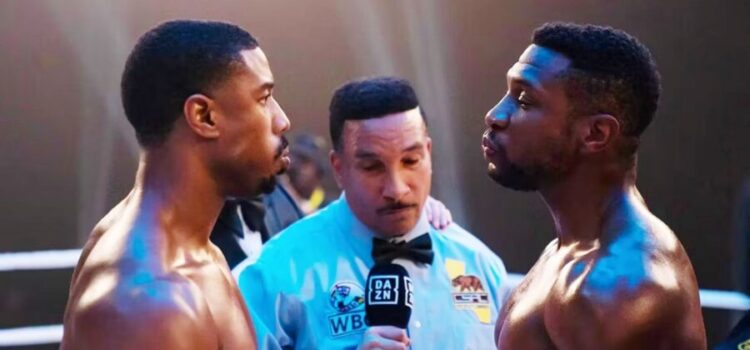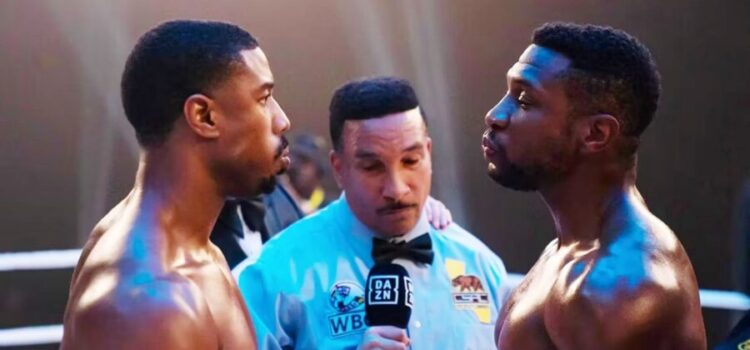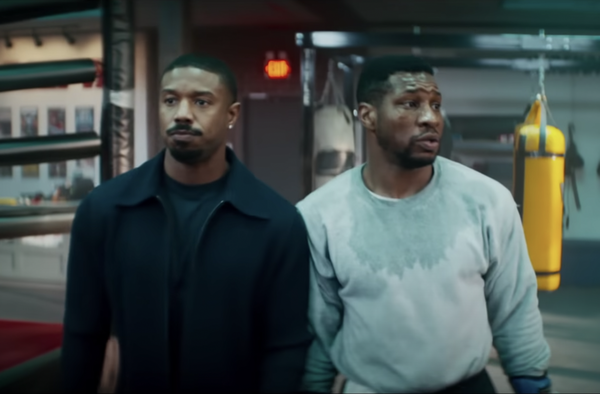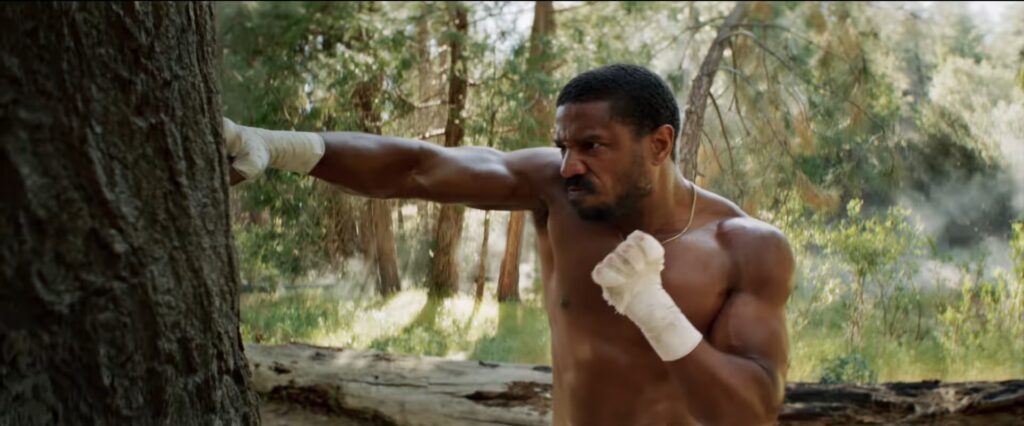By Alex McPherson
Ambitious but held back by genre conventions, Michael B. Jordan’s directorial debut “Creed III” features great performances and viscerally engaging boxing sequences, while sidelining its more thoughtful ideas to a fault.
Continuing the story of Adonis “Donnie” Creed (Jordan), the son of Rocky Balboa’s rival-turned-friend Apollo, “Creed III” sees our hero encountering ghosts from his past entering the literal and figurative arena. We begin with a flashback to 15-year-old Adonis (Thaddeus J. Mixson) sneaking out of his mother’s house to watch his best pal Damian Anderson (Spence Moore II) compete in a local Golden Gloves competition.
Damian, a boxing prodigy, dreams of one day becoming the world heavyweight champion. His hopes come to a screeching halt as Adonis starts an altercation with someone outside a liquor store. Damian is arrested in the ensuing scuffle, spending 20 grueling years behind bars, and Adonis gets away.
Seven years after the events of “Creed II,” Adonis announces his retirement from boxing to spend time with his wife, Bianca (Tessa Thompson), who’s now a music producer; his deaf daughter Amara (Mila Davis-Kent); and his adoptive mother, Mary-Anne (Phylicia Rashad).
A few years later, Adonis runs a boxing academy, training his new protégé, Felix Chavez (Jose Benavidez), for a title shot against Viktor Drago (Florian Munteanu), with the help of the gruff, wise Tony “Little Duke” Burton (Wood Harris). Sylvester Stallone’s Rocky, such a pivotal presence in the previous “Creed” films, is nowhere to be found.
Everything seems to be working out quite nicely for Adonis. He’s rich, with a happy family, and has secured his place among the boxing legends. What he isn’t ready for, regardless, is a reckoning with his past. Damian (a scene-stealing Jonathan Majors) shows up outside his gym unexpectedly, looking to make up for lost time. Adonis and Damian’s interactions are awkward, mixing flashes of their former camaraderie with creeping unease and resentment. Damian, as it turns out, isn’t so thrilled about Adonis’ success, and wants to finally realize his goals through whatever means necessary.
Adonis — bottling up feelings of guilt, trauma, and diminishing self-worth — must confront this symbol of his past and make peace with it for good. This involves an eventual heart-to-heart (or, rather, fist-to-face) in the place most conducive to resolving conflict: the boxing ring, in front of boatloads of rabid fans.
Indeed, for all of Jordan’s high-minded aspirations, “Creed III” ultimately plays it safe, pitting Adonis against a frustratingly limited antagonist reverting back to a predictable formula, and using its layered themes as window-dressing for seen-it-before spectacle. It’s still entertaining, though — delivering the bruising set-pieces, extravagant training montages, and reliably solid performances we expect, albeit not breaking free of tradition to deliver a KO.
As a directorial debut, “Creed III” is impressive, with Jordan competently helming the action and giving actors plenty of room to flex their chops. The boxing scenes themselves remain the highlight; cinematographer Kramer Morgenthau puts viewers right in the thick of it, giving each punch a tactile sting. Jordan also uses slow-motion to emphasize their raw impact and the considerations behind each jab, while being unafraid to take a more “artistic” approach in visualizing the boxers’ inner thoughts during climactic showdowns. The film gets quite brutal at times, leaving viewers with both feelings of cathartic excitement and, perhaps, a bit of exhaustion.
Outside the ring, “Creed III” is far less stylish, with muted color grading and conventional framing of dialogue-heavy scenes, interspersing flashbacks to that fateful day in Adonis and Damian’s history. Joe Shirley’s score is chock-full of memorable tunes and recurring motifs, which help propel the proceedings along and lend even the less successful moments a distinct identity.
Jordan continues to shine as Adonis — depicting his range as a loving father, devoted husband, yet someone whose ego and sense of “masculinity” affects his willingness to be vulnerable. Despite his lavish home and outward appearance of strength and happiness, Adonis is battling self-doubt regarding his accomplishments, exacerbated by Damian’s re-emergence and subsequent manipulation.
Having already watched Adonis ascend through the boxing ranks and manage his father’s legacy (a central theme of the previous films), it’s interesting, in theory, to watch him grapple with his fame, and recognize just how easily it could have gone the other way — although this introspection leads (unsurprisingly) back to the blunt boxing ring, the ultimate mediator. Majors proves a worthy foil in Damian, bringing a jumpy, volatile energy ensuring him and Jordan are always engaging to watch interact onscreen, ignoring the script’s clunkiness.
Thompson gives characteristic gravitas to Bianca, who plays an ancillary role to Adonis’ arc but faces her own challenges; having progressive hearing loss, she’s had to stop her singing career. Davis-Kent (who’s deaf in real life) holds her own alongside Jordan, Thompson, and Majors — making the most out of a role that’s ultimately setting the stage for a “Creed” spinoff down the road.
The bulk of the film’s issues stem from the framing of Damian as an over-the-top adversary. Damian’s a damaged man, looking for retribution against his childhood friend: they grew up together, but he took a vastly different life path, largely due to chance. With this backstory, Damian should be easy to sympathize with, but “Creed III” too often sways to extremes — depicting Damian as a taunting and merciless individual who, at times, seems less like a flesh-and-blood human being than a “big bad” for our (flawed) lead to vanquish.
By the end, “Creed III” largely eschews the moral ambiguity that was initially so interesting to deliver the usual thrills and avoid deeper insight into both Damian and Adonis’ psyches; in the end, it lacks the emotion that might take it to another level. This isn’t necessarily a bad thing, but considering the talent involved and a premise begging for more depth, the cast deserves better — especially Majors, whose versatility as a performer isn’t fully capitalized on.
For most viewers, however, “Creed III” will suffice, if not exceed expectations. The fundamentals are all there, but this story could have used another bout of training.
“Creed III” is a 2023 sports action-drama directed by Michael B. Jordan and starring Jordan, Jonathan Majors, Tessa Thompson, Mila Kent-Davis and Wood Harris. It is Rated PG-13 for intense sports action, violence and some strong language and runtime 1 hour, 54 minutes. It opened in theaters March 3. Alex’s Grade: B-.
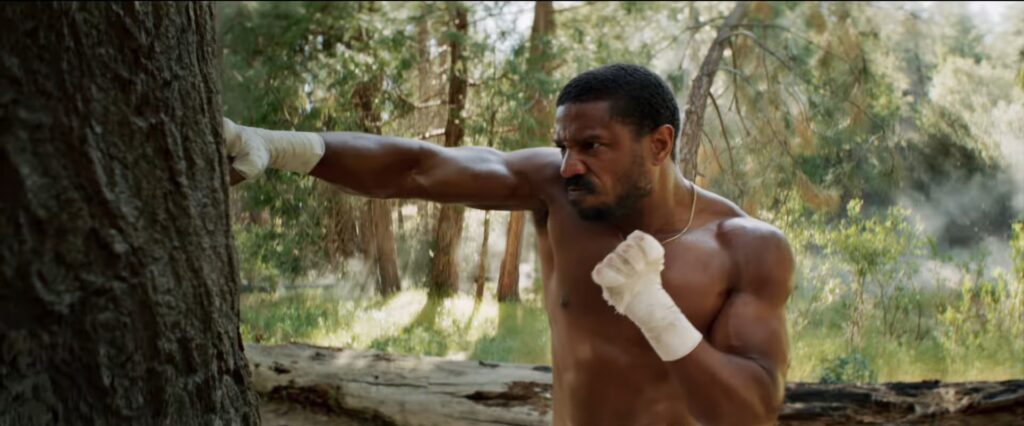
Alex McPherson is an unabashed pop culture nerd and a member of the St. Louis Film Critics Association.

